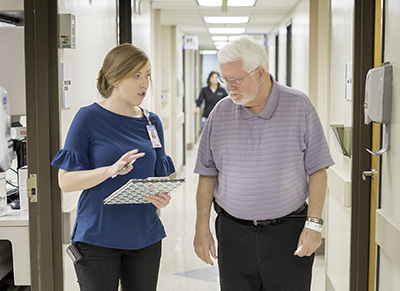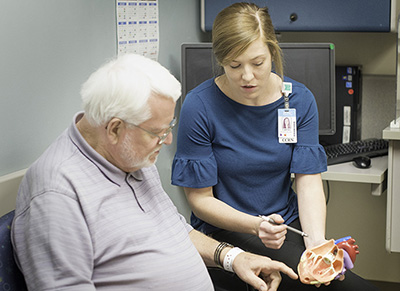Preparing for Clinic Day

Your clinic day at the UNC Main Campus will consist of visits with your doctors and other medical staff for your evaluation.
During your visit to the valve clinic you may also have additional appointments within the building. You will start by checking in with the Registration Desk on the ground floor of Memorial Hospital; here they will direct you to your first destination. Employees within the hospital are always happy to help if you need assistance. You will receive an itinerary in the mail from our office with your planned schedule.
This is a day full of testing, education, and discussion of treatment. Please bring family members for support, as you feel necessary. You will receive a large amount of information and questions may arise after you have left the clinic. Please call our office with any questions or concerns that you may have.
Below is a description of some of the tests you may be scheduled for.
Pre-Op Testing
TTE (TransThoracic Echo): This test is an ultrasound of your heart that is obtained by

placing a probe on the patient’s chest. This allows us to see your heart’s chambers and valves. We are able to obtain numerous measurements from these pictures.
TEE (TransEsophageal Echo): This is an ultrasound of your heart that is performed through a probe that is placed down your throat. You will receive medication to make the procedure more comfortable. Due to this medication, you should have someone drive you to the hospital. You should have nothing to eat or drink 8 hours before the procedure.
CT Scan: This test allows us to map your vessels and guides our plan for your treatment. We are able to see the size and location of your vessels. We are also able to use this scan to measure the size of your aortic valve to help us pick the best valve for you. You should have nothing to eat or drink 2 hours prior to the procedure.
PFTs (Pulmonary Function Tests): This test measures your lung function. You will blow into a tube to determine how well your lungs are functioning.
Labs: Blood will be drawn from your arm and tests will be run. We use this to see how thin your blood is, your blood count, how well your kidneys are working, what your electrolyte levels are, and other tests used to help guide how to treat you best.
EKG (electrocardiogram): You will have stickers placed on your chest and wires attached to the stickers. This test will show us the electrical activity, or rhythm, of your heart. This will show whether you have an abnormal rhythm.
PreCare: You will visit with the anesthesiologist to go over risks of medications. You will visit with the precare nurse who goes through your medical history. You will also have a chest xray.
Carotid Dopplers: You may have an ultrasound of your neck to evaluate for tightness in your arteries. A probe is placed on your neck and your arteries are evaluated for narrowing or blockages. These arteries are important because they take oxygen from the heart to the brain.
Frailty Testing: Your nurse coordinator will perform a 5 meter walk or 6 min walk with you in clinic. She will also ask you questions about your heart failure symptoms and daily activities. These questions help evaluate your overall health.